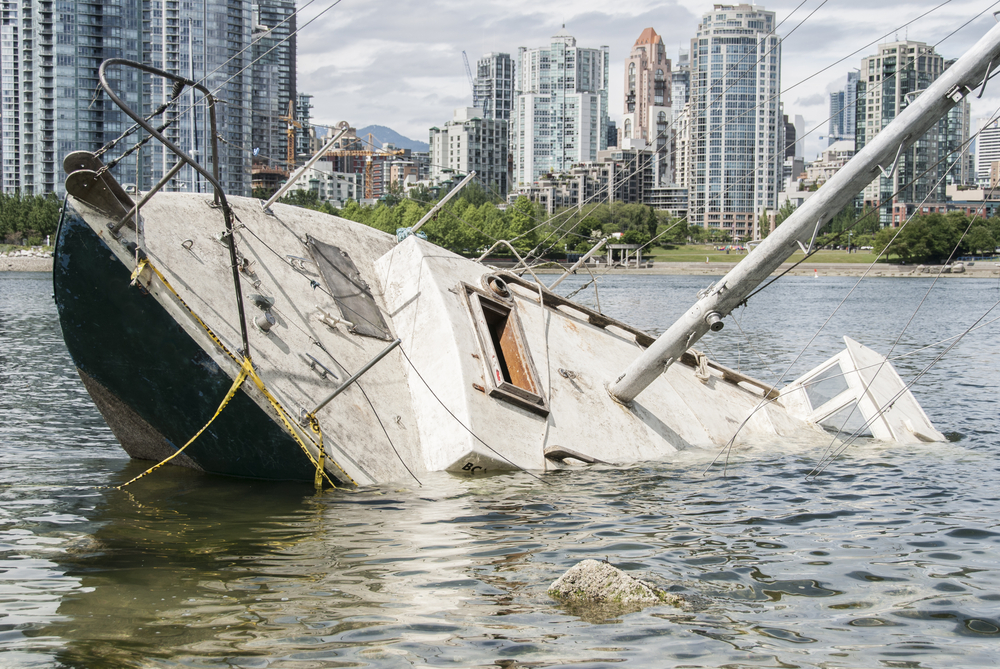Boating accidents can be devastating, often leading to serious – if not fatal – injuries for all who are onboard the vessel. Although several factors can contribute to a recreational boat crash, the majority of incidents are the result of someone’s negligence or wrongdoing. Boating under the influence is one of the main contributing factors for maritime incidents, and unfortunately, BUI laws are not as strict as DUI laws are in most states their enforcement is for obvious reasons much more difficult. While the blood alcohol limit to operate a motor vehicle on land is 0.08 percent in most cases, the majority of BUI laws set the limit higher, at 0.10 percent. Then because monitoring boaters on the open waters ways is much more difficult than setting up a roadside check point, enforcement is lower and so people aren’t as vigilant about their consumption of alcohol when boating as they might be when driving.
Other factors that have been known to increase the likelihood of a serious boating accidents are speeding, failure to pay attention to surroundings and pilot inexperience. Sadly, while there are maritime laws in place that guard against boating accidents, there are many people who either disregard them or are unaware of them. Additionally, because not all states have adequate boating laws designed to uphold maritime safety or the agencies to provide safety training for boaters, accidents that could have otherwise been preventable continue to occur with increasing frequency.
According to the U.S. Coast Guard’s 2011 Recreational Boating Statistics report, the number of fatal boating accidents is increasing at an alarming rate. A 12.8 percent increase in the number of boating-related fatalities was reported in 2011 from the previous year’s rate, but the worst part about it was the fact that the majority of these fatalities may have been completely preventable.
The Coast Guard’s report showed that drowning was the cause of death in 70 percent of all reported boating accidents and out of the total number of deaths, an unbelievable 84 percent of the victims were not wearing life jackets. This illustrates just how dire the need to improve maritime safety regulations has become.
Moreover, the Coast Guard report demonstrated how safety instruction courses were able to prevent several boating accidents during the year. Only 11 percent of the reported deaths took place on vessels where pilots had received boating safety instruction and just 7 percent of the total fatalities took place on vessels where the operator had received boating safety instruction from a NASBLA-approved course provider. The National Association of State Boating Law Administrators (NASBLA) is national nonprofit organization whose goal is to increase awareness of boating safety and reduce the number of maritime accidents and fatalities.
Despite these figures, many states wait until there is an irreversible tragedy to take action and improve boating safety regulations, which is exactly what happened in Georgia.
Last summer, the death of 11-year-old Kile Glover rocked the state and opened residents’ eyes to the dangers that exist on the water. Glover, the stepson of R&B singer Usher, was injured on Lake Lanier after a family friend who was operating a jet ski crashed into an inner tube Kile and a friend were riding in. Although the young victim was transported to an area hospital immediately, he died two weeks after the incident from his injuries.
As difficult as it is to lose a loved one in a boating accident, when the victim is a child, the loss is that much greater. It was precisely this young boy’s tragic death that led state legislators to introduce a bill that would improve boating safety. And after hearing testimony from Glover’s mother, Tameka Raymond, and maritime industry leaders, the Natural Resources and the Environmental Committee voted unanimously to pass the boating safety law, which will go into effect in mid-May, just before the start of this year’s boating season.
Governor Nathan Deal signed the bill into law yesterday after it rapidly passed through the state’s legislature. Along with Glover’s accident, several other fatal boating accidents occurred last summer on Lake Lanier, demonstrating the need to improve safety regulations in the area, as well as throughout the entire state.
Among the many safety provisions that have been imposed, the new law will:
- Lower the legal blood alcohol concentration threshold for boaters from 0.10 to 0.08 percent – the limit for automobile drivers to get a DUI – making it easier for intoxicated boaters to be charged with BUI.
- Require boat operators who are born on or after Jan. 1, 1998 to complete a boater education program.
- Require life jackets for boat passengers who are under thirteen years of age.
- Mandate boaters who rent or lease a personal watercraft to undergo a safety briefing
.
When asked her opinion about Georgia’s new boating safety law, Tameka Raymond explained she was “very optimistic” about it.
“I’m very optimistic,” said Raymond. “I’m hopeful someone else can learn from [my son’s] tragedy.”
Unfortunately, even with the new law, there is only so much legislators can do to prevent boating accidents. Just like there are thousands of drivers who disregard motor vehicle laws, boaters are likely to disregard boating safety laws as well.
Raymond and others who attended the bill signing warn about being careful out on the open waters and for everyone to do their part to reduce the number of boat-related injuries and fatalities.
“I would just want everyone to be mindful – just be a little more mindful,” Raymond said.
Always wearing a life jacket while on the water, designating a sober and experienced person who has taken a boater safety instruction course to be the boat operator and being aware of your vessels speed, course and what is around you are simple ways in which the number of accidents involving personal water crafts and boats can be significantly reduced.
Published on April 24, 2013
Categories: Boating Accidents
Get Free
Consultation










